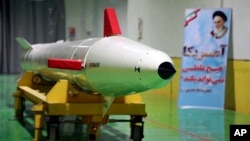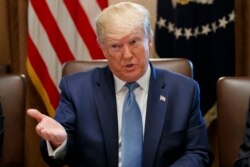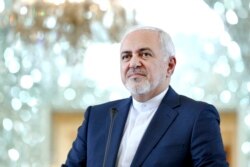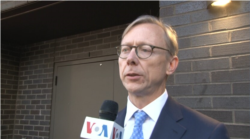Story last updated at 1:36 am.
This article originated in VOA’s Persian Service. VOA Persian’s Katherine Ahn contributed from Washington.
President Donald Trump has responded to Iran's top diplomat raising the idea of talks about its missile program by saying Iran cannot test ballistic missiles that are seen by the U.S. as vehicles to carry nuclear bombs.
Speaking to reporters Tuesday at a White House Cabinet meeting, Trump said that in addition to his belief that Iran must not develop a nuclear weapon, "they can't be testing ballistic missiles, which right now under that agreement [the 2015 Iran nuclear deal] … they would be able to do."
A U.N. Security Council resolution that endorsed Iran's 2015 deal with world powers "called upon" — rather than obligated — Iran to refrain from testing missiles capable of carrying nuclear warheads. The nuclear deal offered Tehran relief from international sanctions in return for constraining a nuclear program that Western powers fear could be used to make bombs. Tehran has long said its nuclear ambitions are peaceful and its missiles are defensive in nature.
Trump withdrew the U.S. from the deal last year, saying it was too weak on Iran, and he began intensifying sanctions against Tehran as a way of pressuring it to negotiate a new agreement to stop all of its perceived malign behaviors.
In an interview with U.S. network NBC News aired on Monday, Iranian Foreign Minister Mohammed Javad Zarif complained that U.S. arms sales to its Gulf allies Saudi Arabia and the United Arab Emirates, who are rivals of Iran, have been "making our region ready to explode."
"So if they [the U.S.] want to talk about our missiles, they need first to stop selling all these weapons, including missiles, to our region," Zarif added. He was speaking on a visit to New York for U.N. meetings.
U.S. Secretary of State Mike Pompeo, speaking alongside Trump at the cabinet meeting, also reacted to Zarif's comment, contending that "for the first time, the Iranians have said that they are prepared to negotiate about their missile program."
"We will have this opportunity, I hope, if we continue to execute our strategy appropriately … to negotiate a deal that will actually prevent Iran from getting a nuclear weapon in the same way that the previous agreement had no chance of actually doing," Pompeo continued.
A spokesman for Iran's U.N. mission, Alireza Miryousefi, posted a tweet asserting that Zarif made only a hypothetical point about talks on Iran's missile program. "Iran's missiles are absolutely and under no condition negotiable with anyone or any country, period," he tweeted.
Trump also made a conciliatory comment toward Iran in his remarks, saying: "We want to help them, we'll be good to them, we'll work with them, we'll help them in any way we can, but they can't have a nuclear weapon." He also reiterated a denial that Washington seeks "regime change" against Iran's Islamist rulers, who have led the nation since a 1979 revolution.
In a Tuesday press briefing, U.S. State Department spokeswoman Morgan Ortagus said the Trump administration repeatedly has said it will talk to Iran without preconditions. “The Iranians just need to show that they are ready to talk,” she added, citing Washington’s frustration with what she called Iran’s “aggressive behavior” in the region.
Speaking separately to VOA Persian in Washington on Tuesday, Trump’s Special Representative for Iran, Brian Hook, said no U.S. officials would meet with Iranian Foreign Minister Zarif while he is in New York, where U.S. authorities have restricted his movements to the U.N. headquarters and two buildings belonging to Iran’s U.N. mission.
Prior to the restriction, the latest in a series of U.S. moves aimed at putting pressure on Iranian leaders, Zarif had been able to move freely within New York City during his U.N. visits.
Hook said the United States would press Iran to scrap its uranium enrichment program in any negotiations. “If you look around the world at all the countries that have nuclear power, half of them do not enrich. Iran does not need to enrich uranium to have peaceful nuclear power,” he said.
In a Tuesday interview with VOA Persian, Brookings Institution foreign policy research director Michael O’Hanlon described the U.S. position of seeking no Iranian enrichment as “remarkably absolutist,” but said he understands the logic behind it. “I don't believe we're going to persuade the Iranians to do it, so on the nuclear file, I don't really see much room for optimism (about a new deal),” he said.
Earlier Tuesday in remarks on state television, Iranian Supreme Leader Ayatollah Ali Khamenei said his nation will continue to reduce its commitment to the nuclear deal. He also repeated his accusation that European nations have not abided by their commitments to ensure Iran benefits economically from the 2015 agreement.
The U.N. nuclear agency confirmed that Iran began enriching uranium to a higher degree earlier this month, surpassing the deal's limit of 3.67% purity. Iran said it was enriching to about 4.5% purity.
Uranium enriched to 5% is sufficient to produce fuel for nuclear power plants, but far below the 90% needed for building a nuclear weapon.







